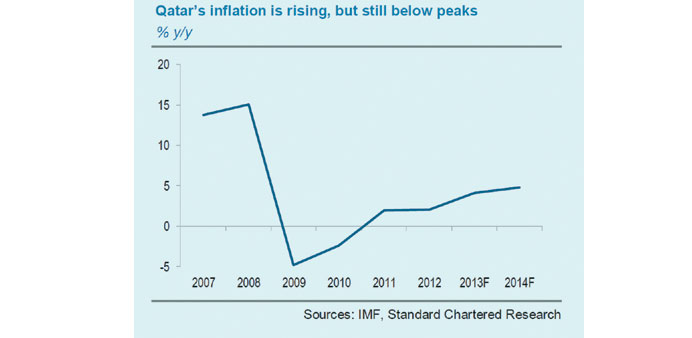|
|
Rising prices of building materials and other raw materials, as well as higher domestic transport and logistics costs, could signal hardening of inflation in Qatar, according to Standard Chartered bank.
Qatar will face numerous challenges in the run-up to FIFA 2022. Logistical challenges will be one, as the country will need to source significant amounts of goods (primarily building materials) and construction equipment to support the upcoming building boom, it said in a report.
“This is likely to translate into inflationary pressure in certain sectors of the economy. We expect the prices of building materials and certain raw materials to begin to rise; domestic transport and logistics costs are also likely to feel the pressure,” the bank said.
For the rest of the year, we see inflationary pressures building up in Qatar, albeit at a very moderate pace, especially as housing markets show signs of stabilisation, it said, adding although inflation is still below peaks.
Historically, from 2005 until 2013, Qatar’s inflation averaged 4.05% reaching an all time high of 16.59% in June 2008 and a record deflation of 9.96% in December 2009.
Observing that Qatar’s consumer price index (CPI) inflation trended higher in 2012, it said January 2013 inflation rose 3.4% year-on-year with the majority of the CPI components moving higher.
The housing component has the largest weighting in the inflation basket (32.2%); while housing has largely weighed down the inflation basket over the last two years, “this trend is changing”, it said, adding in January 2013, housing inflation rose 4.4% y-o-y and 1.1% month-on-month.
“With more non-oil projects coming on stream, the housing market is likely to stabilise as demand for units builds up on the back of job creation,” it said.
It said imported inflation — primarily via food (13.2% of the CPI basket) — is also rising, in line with global recovery in commodity prices.
“We maintain our view of moderate 2013 inflation (3.8%) for Qatar; however, from 2014 onwards we expect to see inflation trend higher as rising imports related to construction activity drive up other components, such as transport (20.5% of the CPI basket); to date these have been subdued,” it said.
Stanchart said inflation is expected to rise to 5.1% in 2014 with real GDP slated to grow 4.8%, slightly lower than the 4.9% growth forecasted for this year.
A latest report from Qatar Statistics Authority found that Qatar’s CPI inflation had risen 3.2% y-o-y in February on higher rents and costlier food, furniture and entertainment, although it was unchanged from January 2013.
According to the International Monetary Fund, Qatar’s average inflation is expected to be 4%-5% in the medium term.
Although CPI inflation is expected to accelerate over 2013, it remains mild and is unlikely to present a threat to macroeconomic stability, according to the updated Qatar Economic Outlook 2012-13 of General Secretariat for Development Planning.
Moving towards 2013, Qatar is expected to witness hardening of inflationary pressure as falling rents would be stripped out of the equation, according to HSBC economists.

